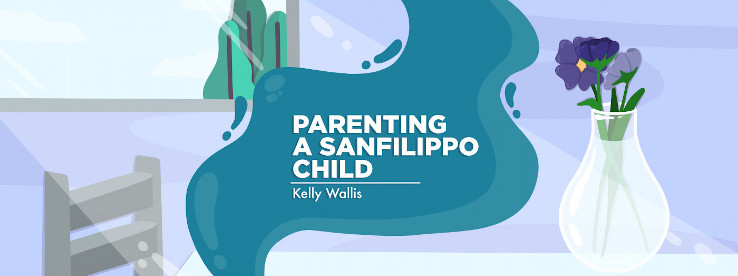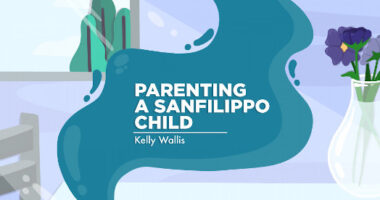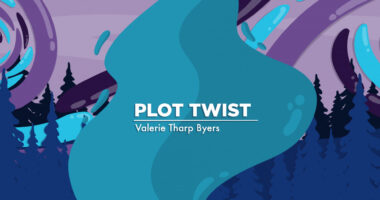Grappling with the fear that I’ll get blindsided once again
How several unexpected losses have shaped my perspective

I revealed in my column last month that I carry around a large amount of emotional baggage. Most of it is related to me having cancer and my oldest daughter, Abby, having Sanfilippo syndrome. My diagnosis was in 2015, and Abby’s was in 2017, so I’ve had several years to live with our reality. Ample time has passed to allow me some perspective and discern how both conditions have affected my emotional state.
After reexamining the years since these diagnoses, I can pinpoint specific times that were harder than others. When my cancer metastasized — after I’d thought I was done with it and moving on with my life — I was devastated. I had to start over and undergo treatment again? It was completely unexpected.
Abby’s diagnosis was incredibly hard to digest. My husband and I knew something was happening with her because of the sharp decline in her skills, but we never expected it to be a terminal disease.
The common thread between these events is that they were unexpected. There was no preparation time for either one. I was blindsided. That’s become my ultimate fear: facing an unanticipated, unfortunate event for which I haven’t prepared. How do you avoid being blindsided while living a contented life?
Why I fear being blindsided
My guess is that my past experiences have shaped this conditioned fear. The moments I’ve been blindsided have been significant: the unexpected death of my dad when I was 22, Abby being whisked away to the neonatal intensive care unit after she was born (we’d thought she was healthy and fine), my cancer diagnosis and then its metastasis, Abby’s diagnosis of Sanfilippo syndrome, and my mom’s unexpected death in 2020.
All of these events centered around sudden loss. There was no opportunity to emotionally prepare for them; they were dumped in my lap out of nowhere. It feels more unfair when awful things happen unexpectedly because you’re forced to deal with the situation even if you’re not emotionally capable of doing so. You’re pushed into an accelerated timeline of coping where you have to accept what’s happened and respond appropriately on short notice.
Trying to find the positive effects of fear
I try to harness this fear in a healthy way. It affords me the courage to ask tough questions and demand honest answers from doctors. I’m not scared to talk to people about sensitive topics like disease and death, which allows me to connect with them.
Fear also enables me to be proactive with Abby’s care. For example, knowing she’ll completely lose her ability to walk at some point is a terrifying reality we have to face. Not knowing exactly when she’d need a wheelchair caused me to start the insurance process to approve one and have her fitted for it way ahead of time. Abby now has an incredible wheelchair sitting in our garage, ready when she needs it.
The negative effects of fear
Of course, the fear of being blindsided can also be problematic, sometimes stirring up irrational worries. I occasionally find myself checking to make sure my husband is still breathing when he’s asleep. I do that with Abby, too, when I check on her at night. I also worry about my other daughter, Emily, getting into a car accident. I realize these fears aren’t totally abnormal, but I think it’s important to gauge them now and make sure they’re not accelerating into an unhealthy obsession.
My fear also has the ability to dampen joyous news or happy occasions. It’s as if I have an invisible ceiling that contains my happy responses. My cancer has been stable for a while now, and although I’m relieved and thankful, I’m also readying myself for when it becomes active again and I must resume chemotherapy. I won’t allow myself to stay in that happy place too long. So I cheat myself out of feeling joy. That’s unfortunate, but I know it’s a coping mechanism that’s in place for self-preservation and protection.
What do I do with this information now? Simply writing about the topic is helpful for me. This column truly is an outlet for my honest feelings, and I’m so thankful to be able to share them here. I also have a wonderful support system with my husband and his family, my family, and friends from different parts of my life. I’ve also learned that I’m a strong person and can withstand quite a bit. Here’s to self-awareness and advocacy!
Note: Sanfilippo News is strictly a news and information website about the syndrome. It does not provide medical advice, diagnosis, or treatment. This content is not intended to be a substitute for professional medical advice, diagnosis, or treatment. Always seek the advice of your physician or other qualified health provider with any questions you may have regarding a medical condition. Never disregard professional medical advice or delay in seeking it because of something you have read on this website. The opinions expressed in this column are not those of Sanfilippo News or its parent company, Bionews, and are intended to spark discussion about issues pertaining to Sanfilippo syndrome.







Leave a comment
Fill in the required fields to post. Your email address will not be published.